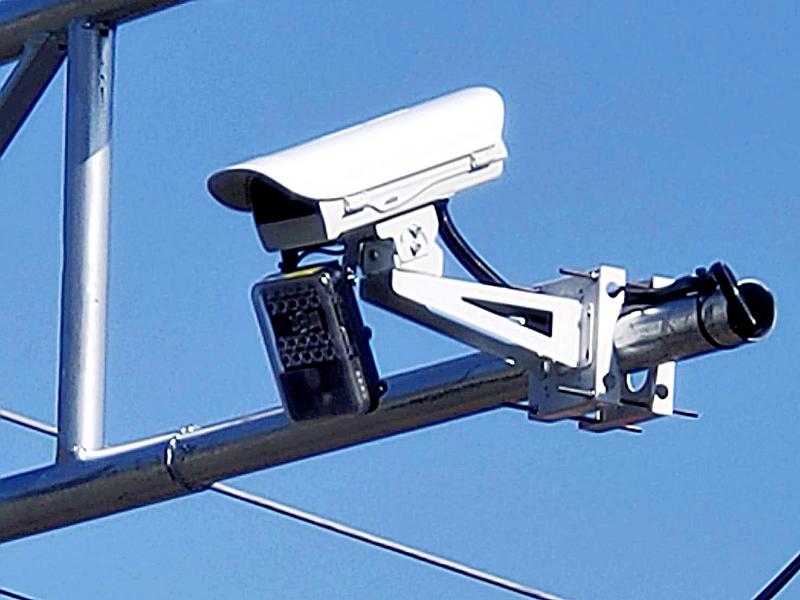Minister of Transportation and Communications (MOTC) Lin Chia-lung (林佳龍) yesterday ruled at a ministerial meeting that speed detectors must be accompanied by a signed affidavit that they contain no Chinese-made parts.
The ruling came a few days after a user named “Leo” wrote on Facebook that Eastern Science and Technology Co (東山科技), a local manufacturer who supplies speed measurement systems to the Directorate-General of Highways (DGH), uses components made in Hangzhou, China, and then places its label on the devices.
“Leo” said that speed measurement systems are a “massive surveillance program,” as the systems identify drivers’ license plate numbers and calculate their average speed between two points so that law enforcement can determine whether vehicles are speeding.

Photo: Tung chen-kuo, Taipei Times
Ministry officials who attended the meeting quoted Lin as saying that the government’s crackdown on traffic violations would affect people’s rights, and that the information security of speed detectors should not be compromised.
While the use of speed measurement systems helps to curb speeding, it has not been proven whether they effectively reduce traffic accidents, Lin said, adding that more reasonable speed limits should be set for certain sections of road.
Manufacturers should immediately sign affidavits that the main components used to build their speed detectors are not made in China, and cannot be exploited to improperly collect or transmit drivers’ data, Lin told the officials.
Firms would need to furnish customs declarations, merchandise certificates and specification sheets for their detectors, Lin said.
Speed detectors that are made in China would be immediately removed, Lin added.
Some manufacturers might say that their products are locally made to evade US tariffs imposed on Chinese products or other restrictions, so a group would be formed to inspect within two months — independently verifying and validating — the speed detectors used by the DGH, Lin said.
The group would include representatives from the Bureau of Standards, Metrology and Inspection; the Industrial Technology Research Institute (工研院); the Chungshan Institute of Science and Technology; and the Taiwan Association of Information and Communication Standards, he said.
The use of speed measurement systems should be suspended until the inspections are completed, Lin said, adding that local government officials are encouraged to work with the ministry if they have speed detectors that should be inspected.
The ministry would no longer subsidize local governments’ detector purchases, as the National Police Agency and local police departments should budget for them, he said.
The ministry said that it would work with the Ministry of the Interior and local officials to relocate detectors to high-risk accident zones.

In his National Day Rally speech on Sunday, Singaporean Prime Minister Lawrence Wong (黃循財) quoted the Taiwanese song One Small Umbrella (一支小雨傘) to describe his nation’s situation. Wong’s use of such a song shows Singapore’s familiarity with Taiwan’s culture and is a perfect reflection of exchanges between the two nations, Representative to Singapore Tung Chen-yuan (童振源) said yesterday in a post on Facebook. Wong quoted the song, saying: “As the rain gets heavier, I will take care of you, and you,” in Mandarin, using it as a metaphor for Singaporeans coming together to face challenges. Other Singaporean politicians have also used Taiwanese songs

NORTHERN STRIKE: Taiwanese military personnel have been training ‘in strategic and tactical battle operations’ in Michigan, a former US diplomat said More than 500 Taiwanese troops participated in this year’s Northern Strike military exercise held at Lake Michigan by the US, a Pentagon-run news outlet reported yesterday. The Michigan National Guard-sponsored drill involved 7,500 military personnel from 36 nations and territories around the world, the Stars and Stripes said. This year’s edition of Northern Strike, which concluded on Sunday, simulated a war in the Indo-Pacific region in a departure from its traditional European focus, it said. The change indicated a greater shift in the US armed forces’ attention to a potential conflict in Asia, it added. Citing a briefing by a Michigan National Guard senior

CHIPMAKING INVESTMENT: J.W. Kuo told legislators that Department of Investment Review approval would be needed were Washington to seek a TSMC board seat Minister of Economic Affairs J.W. Kuo (郭智輝) yesterday said he received information about a possible US government investment in Taiwan Semiconductor Manufacturing Co (TSMC, 台積電) and an assessment of the possible effect on the firm requires further discussion. If the US were to invest in TSMC, the plan would need to be reviewed by the Department of Investment Review, Kuo told reporters ahead of a hearing of the legislature’s Economics Committee. Kuo’s remarks came after US Secretary of Commerce Howard Lutnick on Tuesday said that the US government is looking into the federal government taking equity stakes in computer chip manufacturers that

CLAMPING DOWN: At the preliminary stage on Jan. 1 next year, only core personnel of the military, the civil service and public schools would be subject to inspections Regular checks are to be conducted from next year to clamp down on military personnel, civil servants and public-school teachers with Chinese citizenship or Chinese household registration, the Mainland Affairs Council (MAC) said yesterday. Article 9-1 of the Act Governing Relations Between the People of the Taiwan Area and the Mainland Area (臺灣地區與大陸地區人民關係條例) stipulates that Taiwanese who obtain Chinese household registration or a Chinese passport would be deprived of their Taiwanese citizenship and lose their right to work in the military, public service or public schools, it said. To identify and prevent the illegal employment of holders of Chinese ID cards or